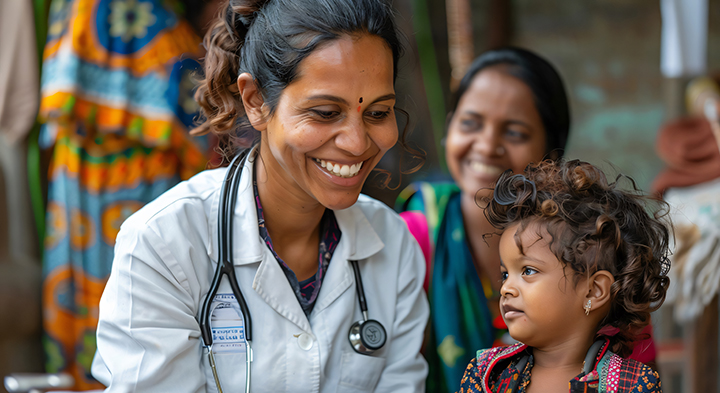2025 Development Cooperation Forum Survey Study

2025 Development Cooperation Forum Survey Study
Time to Change: Realigning International Development Cooperation with Developing Countries' Needs and Priorities amid Rising Global Pressures
View the StudyView the Programme & Concept Note
The 2025 Development Cooperation Forum Survey Study was launched at the Fourth International Conference on Financing for Development (FFD4) in Seville, Spain on Wednesday, 2 July 2025 from 2:30–4:00 PM, under the title: "Realigning International Development Cooperation with Developing Countries' Needs and Priorities amid Rising Global Pressures".
International development cooperation is at a turning point. Over the past decade, economic turbulence, shifting geopolitical dynamics, the escalating climate crisis, recent cuts in ODA by some major donors and evolving global priorities have reshaped the development cooperation landscape. In this context, the 2024/2025 Development Cooperation Forum (DCF) survey provides an in-depth analysis of how developing countries are navigating these changes, leveraging key enablers, and redefining partnerships to drive their sustainable development agendas forward.
The survey’s findings provide a strong and urgent call to action: if international development cooperation is to be genuinely transformative, global development partners must go beyond rhetoric and honor their commitments with greater predictability, flexibility, and responsiveness to the needs and priorities of developing countries.
Launch Statement by Mr. Navid Hanif, Assistant Secretary-General for Economic Development, UN DESA
Purpose of the Survey
The Study aims to generate actionable insights to inform ongoing efforts to strengthen development cooperation and make it more effective in addressing current and future global challenges.
Specifically, the Survey seeks to:
• Provide evidence-based inputs for intergovernmental deliberations, particularly for the DCF high-level meeting and the Fourth International Conference on Financing for Development (FFD4).
• Support national mechanisms for accountability, improve the quality, impact, and effectiveness of development cooperation, including for integrated national financing frameworks (INFFs).
• Examine and strengthen key enablers of effective development cooperation, such as national policies, results frameworks, coordination forums, information systems, and capacity support.
Participation and Methodology
A total of 75 developing countries participated in the 2024/2025 survey. By ensuring confidentiality, the Survey creates a safe space for sharing candid insights and challenges. This enables the generation of reliable evidence that reflects the realities of partner countries —promoting a holistic, resilient, and forward-looking approach to high-impact development cooperation in all its forms that is aligned with the needs and priorities of developing countries.
The 2025 DCF Survey Study is built on empirical evidence collected over a 6-month period from 2024 to 2025.
Key Questions explored
|
2025 DCF Survey Study contributes to:
- Tangible impact of country responses
Confidential and frank country responses and inputs are directly fed, without attribution, into the UN-led inter-governmental and inter-agency processes:
- High-level Political Forum on Sustainable Development
- ECOSOC Forum on Financing for Development
- Development Cooperation Forum
- Inter-Agency Task Force on Financing for Development
Detailed analyses of findings are used to generate practical recommendations for policy makers and practitioners at the global, regional, national and local levels, and are made available in the DCF Survey Study.
- Structured assessment around key enablers
The DCF Survey helps governments assess how effectively their development cooperation systems work by examining the state of 5 key enablers: national development cooperation policies (NDCPs); country-driven results frameworks (CRFs); national development cooperation forums (NDCF); development cooperation information systems (DCIS); and capacity support.
- Support INFFs and voluntary national reviews
The enablers of effective development cooperation can serve as building blocks in designing and implementing integrated national financing frameworks (INFFs) and optimal mobilization and management of financial and non-financial resources to achieve national sustainable development strategies. Participation in the DCF Survey exercise can also facilitate countries’ preparation and follow-up of Voluntary National Reviews of progress towards the SDGs.
- Incentivized behavioral changes
The DCF Survey:
- Includes questions on targets for individual development cooperation partners.
- Encourages inclusive participation, beyond governments, of both domestic and international non-state actors, as well as beneficiaries.
- Emphasizes the role of parliamentarians and local and regional governments in monitoring and data.
- Promotion of a holistic, resilient and forward-looking approach to high-impact development cooperation in all its forms
The DCF Survey addresses key issues of quality, impact and effectiveness of international development cooperation in a holistic and forward-looking way, while also diving into issues of crises response, recovery and resilience building by examining:
- Integrated and resilient approaches to development cooperation that consider the three dimensions of sustainable development (economic, social and environmental)
- Links to domestic resource mobilization and mobilizing the full range of means of implementation.
- Private and blended development cooperation.
- Capacity support for effective development cooperation and multi-stakeholder engagement
- Examining high-impact development cooperation in all its forms, including financial, non-financial, technical assistance, partnerships and collective actions in support of policy change
 Welcome to the United Nations
Welcome to the United Nations 
